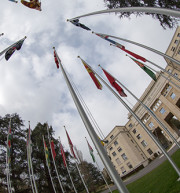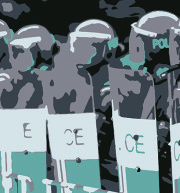
Issue No. 27 of the Assembly and Association Briefing, the newsletter of Maina Kiai, UN Special Rapporteur on the rights to freedom of peaceful assembly and of association. In this our final issue: • Kiai completes term as Rapporteur, hands over mandate to Annalisa Ciampi • A thank you message from former Special Rapporteur Maina Kiai – and news on work yet to come • Kiai launches FOAA Online! – a web-based collection of legal arguments on assembly and association rights • Special Rapporteur files interventions in South Africa and Zimbabwe cases • Venezuela: allow peaceful protests and investigate killing of demonstrators • UN experts urge Russia to drop Jehovah’s Witness lawsuit which threatens religious freedom • Russia: “Immediately release detained peaceful protesters” • UN rights experts urge lawmakers to stop “alarming” trend to curb freedom of assembly in the US • Ahead of referendum, UN experts warn Turkey about impact of purge on rights • UN experts urge United Arab Emirates: “Immediately release Ahmed Mansoor” • Belarus: expert decries of violence against protestors, demands release of all detained • Hungary urged by UN expert to reconsider new law targeting Central European University • Maina Kiai’s Testimony... Continue reading →

Dear friends and partners, Yesterday marked my last day as UN Special Rapporteur on the rights to freedom of peaceful assembly and of association – a bittersweet occasion to be sure, but also one that marked the first step in a new journey. I’m writing to express my sincerest and deepest thanks to each and every one of you who has interacted with the mandate since 2011. Your work, input and dedication was crucial in helping the mandate accomplish so much in its first six years of its existence. Your efforts truly made the mandate yours – a vehicle of the people it’s supposed to represent. It was inspiring to work with all of you, and I hope to have the chance to do it again soon. I also hope that you will be just as engaged with my successor, Ms. Annalisa Ciampi, who takes up her functions as Special Rapporteur today. I am also writing to give an overview regarding what will become of mandate-related work and communications. Our website, freeassembly.net, will continue to be live and accessible for the foreseeable future. Regular updates will continue at least through the end of June, as the UN releases my final thematic report (on civil society’s contributions over the years) and final country reports (on the USA and UK visits). I hope the site continues to serve as a valuable... Continue reading →

По мере приближения срока завершения моего мандата, я стал размышлять о тех годах, что я провел на этой позиции, а именно о том, насколько изменился мир всего лишь за шесть лет с момента начала моего мандата, созданного Советом по правам человека ООН. Октябрь 2010. Разве мог кто-либо предположить, что принесут нам 2011-2017 годы? В то время права на свободу мирных собраний и объединений терялись в пантеоне общих и наиболее ценимых прав: о них знали, но редко они были главной новостью. В последующие годы, они легли в основу самых поворотных событий 21 века: революции в Тунисе, Египте и в других странах; массовые протесты, которые вынудили руководство таких стран, как Украина, Гватемала, Исландия, Южная Корея, Буркина Фасо и... Continue reading →

As my time as Special Rapporteur nears its end, I have been reflecting a great deal on my six years in the position - and just how much the world has changed since the Human Rights Council created my mandate in October 2010. Could anyone have imagined what the years 2011-17 would bring? Back then, the rights to freedom of peaceful assembly and of association were somewhat neglected in the pantheon of our most cherished rights - known, but rarely in the headlines. In the years since, they have underpinned some of the most cataclysmic political events of the 21st century: revolutions in Tunisia, Egypt and elsewhere; mass protests that forced out leaders in Ukraine, Guatemala, Iceland, South Korea, Burkina Faso and Brazil; citizen movements in Hong Kong, Bahrain, Malaysia, the United States; and so much more. And remarkably, all of this happened while governments everywhere were embarking upon the most comprehensive rollback of civic freedoms since the end of the Cold War: anti-NGO laws, restrictions on protests, increased militarization of police, and campaigns of violence, intimidation, stigmatization and arrests against activists, just to name a few. As Special Rapporteur, I was lucky enough to have a front row seat as these events unfolded - to witness them, to meet with the people who shaped them,... Continue reading →

NAIROBI/WASHINGTON – Special Rapporteur Maina Kiai has been named the recipient of the American Federation of Labor and Congress of Industrial Organizations’ (AFL–CIO) 2016 human rights award, and will be in Washington, DC, to accept the honor on Dec. 14, 2016. The annual prize – known officially as the George Meany-Lane Kirkland Human Rights Award – was created in 1980 to recognize outstanding examples of the international struggle for human rights through trade unions. It is named for the first two presidents of the AFL-CIO. Kiai, who is the United Nations Special Rapporteur on the rights to freedom of peaceful assembly and of association, is receiving the honor “in recognition of his dedication to and effectiveness in highlighting the widespread denial of fundamental human rights at work and in society.” The Special Rapporteur has made the issue of assembly and association rights in the workplace a central theme of his mandate, focusing on the subject in his 2016 report to the General Assembly and addressing labor issues extensively during his official visits to UN Member States. “It is a singular honor to receive the 2016 George Meany-Lane Kirkland Human Rights Award – not only because of its stature, but also because it comes from the labor rights community,” Kiai... Continue reading →

Commentary by Maina Kiai, UN Special Rapporteur on the rights to freedom of peaceful assembly and of association It’s been well documented in recent years that space for ordinary people to exercise their fundamental freedoms – and to participate in their own governance – is closing at a rapid and disturbing pace worldwide. A 2015 study, for example, showed that the core freedoms of expression, association and peaceful assembly were violated to a significant degree in at least 96 countries during 2014. And that is only one of many indicators. What’s less discussed is that space to exercise fundamental freedoms is closing at the international level as well. And ground zero, shamefully, is the very place where these rights should be thriving: The United Nations, one of whose pillars, ironically, is human rights. The United Nations human rights bodies and mechanisms, including the Human Rights Council, are key spaces for NGOs to exercise their rights to freedom of expression, association and peaceful assembly that are so frequently denied back home. But the same governments that are restricting NGOs domestically are stepping up efforts to take away NGOs’ voices on the international stage as well. They are doing this by hijacking, and subsequently closing, the main door used by civil society... Continue reading →

The Special Rapporteur’s factsheet summarizing his joint 2016 report with fellow mandate holder Christof Heyns, which outlined a series of practical recommendations for the proper management of assemblies. The report was developed based on consultations with over 100 experts and more than 50 UN Member States. This factsheet draws heavily on the report and answers a number of questions regarding the management of assemblies, including: • Do assembly participants forfeit all of their rights if they are not peaceful? • Do human rights protections apply to everyone participating in an assembly? • Do States have a positive obligation to facilitate assemblies? • Should states require demonstrators to obtain prior permission for assemblies? • Can firearms be used to disperse a violent assembly? • Is there a right to observe, monitor and record assemblies? • Does the right to privacy apply in the context of assemblies? • Do businesses have a duty to respect rights in the context of assemblies? For the Special Rapporteur’s full factsheet series, please see:... Continue reading →

GENEVA – Two United Nations human rights experts presented today a new report to the UN Human Rights Council offering extensive recommendations to States and police forces around the world on how best to manage public gatherings. “The proper management of assemblies can in many cases serve to prevent an escalation of the situation and the eventual outbreak of violence. We believe that proper precautions and preparations can help to protect the rights of all concerned - the demonstrators, bystanders and the police,” said the Special Rapporteur on extrajudicial, summary or arbitrary executions, Christof Heyns, and the Special Rapporteur on the rights to freedom of peaceful assembly and of association, Maina Kiai. The report is the result of consultations with more than 50 States and 100 experts from civil society, academia, protest groups, national human rights institutions and police forces. “Our many conversations with States and experts confirmed that the ability to meet and act collectively is vital to democratic development and to the expression of ideas,” Mr. Kiai said. “Human rights are often violated in the context of assemblies, sometimes unintentionally. These recommendations are aimed at providing all involved with a common frame of reference of how this world-wide form of... Continue reading →

GENEVA – Special Rapporteur on extrajudicial, summary or arbitrary executions, Christof Heyns, and Special Rapporteur on the rights to freedom of peaceful assembly and of association, Maina Kiai, will appear before the Human Rights Council on 9 March 2016 at 1:30 p.m. (Geneva time) to present their joint report on the proper management of assemblies. The presentation and interactive dialogue will be broadcast live on http://webtv.un.org/ The report summarises applicable international legal standards, and offers practical recommendations to States on how these principles might be implemented. The report has been drafted pursuant to a request from the Council in resolution 25/38. In developing the recommendations, the Special Rapporteurs consulted widely through a written questionnaire and in-person meetings with over 50 Member States, and with over 100 experts, drawn from academia, civil society, protest movements, and National Human Rights Institutions. “Our many conversations with States and experts confirmed that the ability to meet and act collectively is vital to democratic development and to the expression of ideas,” Mr. Kiai said. “It also confirmed that basic human rights are routinely violated in the context of assemblies. These recommendations provide a roadmap on how to avoid... Continue reading →

The ability to assemble and act collectively is vital to democratic, economic, social and personal development, to the expression of ideas and to fostering engaged citizenry. Assemblies can make a positive contribution to the development of democratic systems and, alongside elections, play a fundamental role in public participation, holding governments accountable and expressing the will of the people as part of the democratic processes. Yet despite the increasingly prominent role that assemblies play in today's world, there remains a lack of clear understanding of the applicable international human rights law and standards. When can a State require advance notification of an assembly, for example? Can authorities place limits on the time, place or manner that protests are conducted? What are the State's duties in terms of facilitating assemblies? In March 2014, the Human Rights Council requested Special Rapporteurs Maina Kiai and Christof Heyns to help answer those questions and more. This report is the result of their work - a compilation of practical recommendations for the proper management of assemblies based on consultations with over 100 experts and more than 50 UN Member States. Written input was also solicited via questionnaires. “Assemblies are not a novel phenomenon – people taking to... Continue reading →